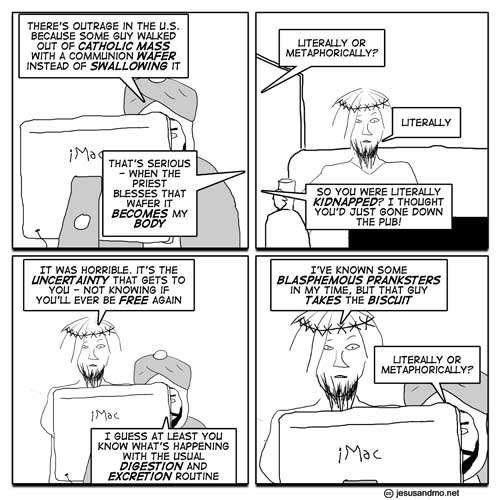Black-and-white thinking prevents us from expressing our native compassion.
Yet such thinking is comforting. We quell our childhood fears of being lost in the dark and dreary wilderness of the world by holding to the iron rod of the word of God (1 Nephi 8:19–23). Making choices can be exhausting and frightening. Limiting our choices helps us cope with the complexity of life. We feel mastery over our world by dividing the grey, chaotic unknown into black and white, good and bad, right and wrong as Adam showed his dominion over the beasts of the field by naming them (Genesis 2:19). Having categorized the world, we feel justified in demanding who is on the Lord’s side? (Exodus 32:26)
Our efforts at rationalizing the complex world are vanity. Chaotic Tiamat bides her captivity until she can triumphally raze our flimsy black-and-white walls and introduce us to the full, riotous spectrum of true human experience. We do ourselves harm in putting our trust in the strength of the arms of our own flesh, putting off until it may be everlastingly too late the day when our defenses against the confusing world will be broken. (Jeremiah 17:5).
Leaves of Grass by Walt Whitman is a case in point. Publishers refused to print it in complete form until almost thirty years after its first edition due to its sexual imagery. Whitman’s poetry was too much for the public sensibility in the era of the Comstock laws.
The great 19th century orator Robert Ingersoll chose to eulogize Whitman with a line drawn from To A Common Prostitute, oft-censored by black-and-white thinkers who object to any mention of prostitution.
BE composed—be at ease with me—I am Walt Whitman, liberal
and lusty as Nature,
Not till the sun excludes you do I exclude you,
Not till the waters refuse to glisten for you and the leaves to rustle
for you, do my words refuse to glisten and rustle for you.…
The Christian defenders of common decency missed the harmony between this poem and the teachings of their messiah. The Jesus of the Bible reveled in defying the black-and-white thinking of his era, just as Walt Whitman did. He chastened the Pharisees for their harsh judgments of the prostitute who bathed his feet with tears (Luke 7:36–50). He preached in the Sermon on the Mount that we should give our love to all, like God causes the sun to rise on both the evil and the good and sends rain to the just and unjust (Matthew 5:45).
I can’t say that Whitman had these biblical passages in mind as he wrote his poem, but the parallels in imagery and sentiment are striking. Whitman, a freethinking, freeloving pantheist, challenged the black-and-white, uncompassionate thinking of his Christian readers. His readers failed to recognize that Whitman and Jesus were kindred spirits.
The line that Ingersoll, the greatest orator of his time, said was “great enough to do honor to the greatest genius that has ever lived” calls us to cast aside our judgments of who is good and who is evil and embrace all in love:
“Not till the sun excludes you do I exclude you,…”
]]>
![]()
